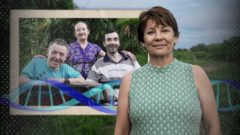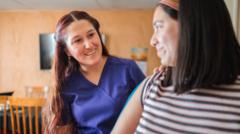In the small town of Serrinha dos Pintos, Brazil, geneticist Silvana Santos discovered Spoan syndrome, a rare genetic condition affecting mobility among local children. Faced with a distinct social landscape where many families are interrelated, her research not only provided answers but also initiated a community dialogue on genetics and health.
Unlocking the Mystery of Spoan Syndrome in a Remote Brazilian Town

Unlocking the Mystery of Spoan Syndrome in a Remote Brazilian Town
Geneticist Silvana Santos uncovers the rare Spoan syndrome affecting families in Serrinha dos Pintos, revealing deep-rooted genetic connections in a population where many are related.
Despite its picturesque setting, Serrinha dos Pintos has harbored secrets that perplexed its residents for years. The small town, with a population of approximately 5,000, has witnessed a troubling trend among its children—a significant number have lost the ability to walk due to an undiagnosed condition. The turning point came over two decades ago when geneticist Silvana Santos ventured to the area and embarked on a groundbreaking investigation that would forever change the lives of many families.
Prior to Santos's arrival, the residents of Serrinha lived in uncertainty regarding their children's health. They were blissfully unaware that a condition known as Spoan syndrome existed, characterized by a debilitating genetic mutation that weakens the nervous system. This condition is inherited when both parents possess the altered gene, a reality Santos meticulously explored.
Santos's efforts marked the first identification and naming of Spoan syndrome, propelling her into a position of importance within the scientific community, eventually leading her to be honored as one of BBC's 100 most influential women in 2024. "She gave us a diagnosis we never had," shared Marquinhos, one of the affected residents, emphasizing the profound impact of Santos's work. With her research, funding, and essential resources like wheelchairs began to flow into the town, turning despair into hope.
An interesting sociocultural factor contributing to the syndrome's prevalence in Serrinha is the high rate of consanguineous marriages. Santos discovered that due to the town's geographical isolation, nearly 30% of couples were related, significantly increasing the risk of genetic disorders. Geneticist Luzivan Costa Reis pointed out that the chances of their children inheriting a rare condition rise substantially in cousin relationships.
Santos's dedication to her research, which included extensive fieldwork, door-to-door DNA sampling, and establishing ties within the community, culminated in a pivotal 2005 study. This work documented over 82 cases of Spoan worldwide and identified the genetic mutation responsible for the condition. Legend suggests that this mutation can be traced back to early European settlers, potentially making its way to Brazil alongside Sephardic Jews and Moors fleeing persecution.
Although there is no cure for Spoan, the awareness has led to significant changes in how families approach the condition. Equipment like wheelchairs has granted newfound independence to many individuals who were previously sidelined. Additionally, community attitudes have shifted, with residents now referring to those affected by Spoan with respect rather than outdated terms.
Education continues to play a vital role as Santos collaborates with Brazil's Ministry of Health on a new project aimed at screening couples for genetic risks. The intention isn’t to discourage cousin marriages but to empower families with knowledge regarding potential health risks. As the town remains intertwined through familial ties, Santos's visits are met with warm familiarity, reinforcing her ongoing connection to the community she has profoundly impacted.
Prior to Santos's arrival, the residents of Serrinha lived in uncertainty regarding their children's health. They were blissfully unaware that a condition known as Spoan syndrome existed, characterized by a debilitating genetic mutation that weakens the nervous system. This condition is inherited when both parents possess the altered gene, a reality Santos meticulously explored.
Santos's efforts marked the first identification and naming of Spoan syndrome, propelling her into a position of importance within the scientific community, eventually leading her to be honored as one of BBC's 100 most influential women in 2024. "She gave us a diagnosis we never had," shared Marquinhos, one of the affected residents, emphasizing the profound impact of Santos's work. With her research, funding, and essential resources like wheelchairs began to flow into the town, turning despair into hope.
An interesting sociocultural factor contributing to the syndrome's prevalence in Serrinha is the high rate of consanguineous marriages. Santos discovered that due to the town's geographical isolation, nearly 30% of couples were related, significantly increasing the risk of genetic disorders. Geneticist Luzivan Costa Reis pointed out that the chances of their children inheriting a rare condition rise substantially in cousin relationships.
Santos's dedication to her research, which included extensive fieldwork, door-to-door DNA sampling, and establishing ties within the community, culminated in a pivotal 2005 study. This work documented over 82 cases of Spoan worldwide and identified the genetic mutation responsible for the condition. Legend suggests that this mutation can be traced back to early European settlers, potentially making its way to Brazil alongside Sephardic Jews and Moors fleeing persecution.
Although there is no cure for Spoan, the awareness has led to significant changes in how families approach the condition. Equipment like wheelchairs has granted newfound independence to many individuals who were previously sidelined. Additionally, community attitudes have shifted, with residents now referring to those affected by Spoan with respect rather than outdated terms.
Education continues to play a vital role as Santos collaborates with Brazil's Ministry of Health on a new project aimed at screening couples for genetic risks. The intention isn’t to discourage cousin marriages but to empower families with knowledge regarding potential health risks. As the town remains intertwined through familial ties, Santos's visits are met with warm familiarity, reinforcing her ongoing connection to the community she has profoundly impacted.







